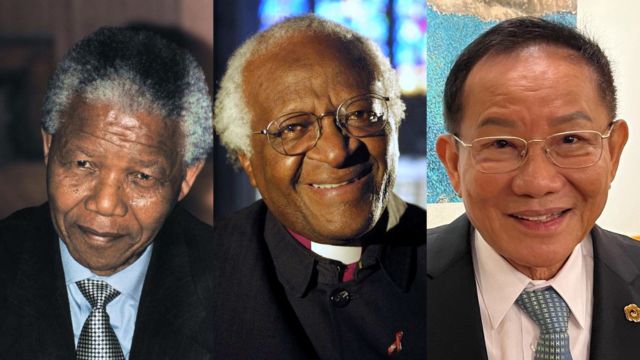Their service to humanity was about promoting an end to discrimination and intolerance and fostering forgiveness, harmony, and peace.
by Peter Zoehrer
*A paper presented at the webinar “A Time to End All Discrimination: FoRB, Intolerance, and the Tai Ji Men Case,” co-organized by CESNUR and Human Rights Without Frontiers on July 18, 2023, Nelson Mandela International Day.

On the occasion of Nelson Mandela Day, a day dedicated to promoting equality and justice, it is crucial to reflect upon the significance of freedom of religion and belief (FoRB) and the consequences of intolerance.
This essay delves into the Tai Ji Men movement and its charismatic leader, Dr. Hong Tao-Tze, who serves as a compelling example of responding to discrimination with the transformative power of love and forgiveness. Furthermore, it draws parallels with the legacies of Nelson Mandela and Desmond Tutu, both renowned for their tireless advocacy of equality, inclusivity, and the elimination of discrimination, even in the face of seemingly insurmountable obstacles. By exploring these interconnected narratives, we gain valuable insights into the indomitable spirit of individuals who dedicate themselves to creating a more just and harmonious world.
Tai Ji Men is a spiritual and cultural organization based in Taiwan. Founded in 1966 by Dr. Hong Tao-Tze, it seeks to promote the values of love, peace, and conscience through the practice of Tai Ji (Tai Chi), Qigong, and other traditional Chinese arts. The movement emphasizes the integration of spiritual cultivation, health, and social responsibility.
In the late 1990s, the Taiwanese authorities initiated a controversial investigation into Tai Ji Men’s legal and tax status, claiming they owed back taxes. Tai Ji Men argued their non-profit status and challenged the government’s actions. This prolonged legal battle caused financial strain and reputational damage to the movement, raising concerns about the fair treatment of non-profit organizations in Taiwan and religious freedom.
Despite facing persecution from his own government, Dr. Hong has remained steadfast in his commitment to serving humanity through his teachings of love and reconciliation. His unwavering dedication has allowed him to spread his message of peace and harmony across the globe, inspiring countless individuals to embrace compassion and work towards a more harmonious world.
One of the ways Dr. Hong has served humanity is through his extensive global peace tours. He has traveled to numerous countries, engaging in dialogues with leaders, scholars, and individuals from diverse backgrounds. These peace tours provide a platform for Dr. Hong to share his wisdom and promote understanding, unity, and cooperation among different cultures and societies.
Additionally, Dr. Hong actively participates in international conferences and forums where he addresses pressing global issues such as religious tolerance, human rights, and environmental sustainability. His presence at these events allows him to advocate for peace and social justice on a global scale, inspiring others to work towards a more harmonious world.
Dr. Hong’s commitment to serving humanity is also evident through his establishment of educational initiatives. He has founded academies dedicated to promoting values of love, peace, and moral education. These educational institutions not only impart knowledge and skills but also instill principles of compassion, empathy, and understanding in the next generations, fostering a more harmonious and inclusive society.
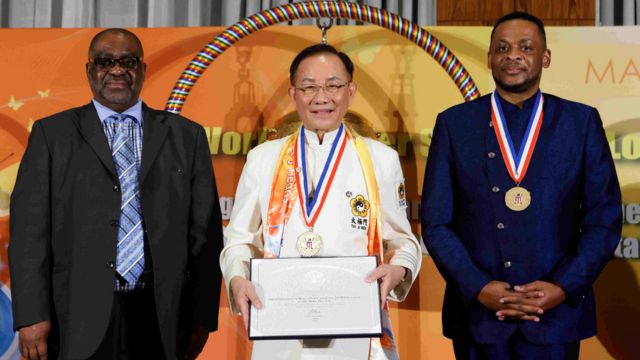
Furthermore, Dr. Hong actively engages in humanitarian efforts, providing assistance to those in need. He has initiated and supported various charitable projects, including disaster relief efforts, healthcare programs, and poverty alleviation initiatives. By extending a helping hand to the less fortunate, Dr. Hong demonstrates his compassion and commitment to improving the lives of others.
In addition to his humanitarian work, Dr. Hong promotes cultural exchange programs, encouraging dialogue and appreciation among different cultures. He believes that cultural diversity is a source of strength and enriches society. Through initiatives such as cultural festivals, martial arts exhibitions, and intercultural workshops, Dr. Hong fosters mutual respect and understanding, bridging gaps between cultures and fostering a sense of unity.
Despite the challenges and persecution he has faced, Dr. Hong Tao-Tze remains steadfast in his mission to serve humanity. His teachings of love, reconciliation, and harmony have touched the lives of countless individuals, inspiring them to embrace compassion and work towards a more inclusive and peaceful world.
Nelson Mandela, an icon of human rights and social justice, dedicated his life to fighting against discrimination and oppression. He championed the ideals of equality, reconciliation, and freedom for all, transcending barriers of race, religion, and belief. His struggle against apartheid exemplified his commitment to eradicating discrimination and ensuring a just society.
Mandela drew inspiration from his African heritage and the traditional values and wisdom of his people. Many African cultures emphasize communal harmony, Ubuntu (the belief in the interconnectedness of humanity), and the importance of forgiveness and reconciliation. Mandela embraced and incorporated these values into his worldview, allowing him to foster a spirit of tolerance and forgiveness throughout his life.
Mandela’s personal journey, including his time in prison, significantly influenced his perspective on forgiveness and reconciliation. While incarcerated, he witnessed firsthand the dehumanizing effects of hatred, anger, and vengeance. Mandela recognized that the only way to break the cycle of violence and achieve lasting peace was through forgiveness, compassion, and understanding. His own transformative journey and his desire to build a unified, non-racial South Africa played a crucial role in his ability to generate the power of tolerance and forgiveness.
Furthermore, Mandela drew inspiration from other global peacemakers, such as Martin Luther King Jr., Mahatma Gandhi, and Mother Teresa, who were renowned for their teachings on love, forgiveness, and nonviolence. While Mandela may not have shared their religious beliefs, he recognized the universal value and power of their teachings and sought to incorporate those principles into his own approach to leadership and social change.
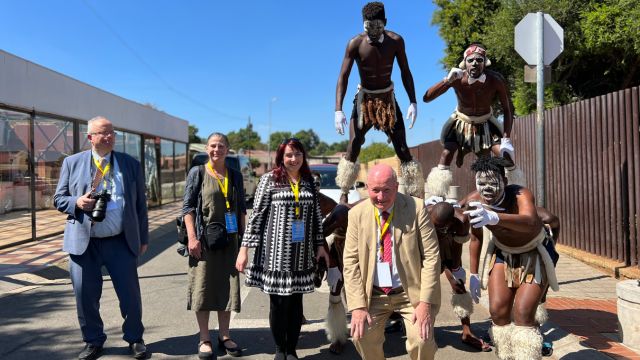
Archbishop Desmond Tutu played a significant role in Nelson Mandela’s life and the struggle against apartheid in South Africa. Their collaboration and shared vision for a just and inclusive society contributed to the eventual dismantling of apartheid and the establishment of a democratic South Africa.
Tutu, a prominent Anglican bishop, became known for his vocal opposition to apartheid and his advocacy for human rights. He played a crucial role in mobilizing international support for the anti-apartheid movement and drawing attention to the injustices perpetrated by the apartheid regime.
Throughout Mandela’s imprisonment, Tutu was a prominent advocate for his release and for the rights of all political prisoners. He used his platform as the General Secretary of the South African Council of Churches to amplify the voices of those fighting against apartheid, including Mandela and other activists. Tutu’s moral authority and unwavering commitment to justice helped galvanize international pressure on the apartheid government.
When Mandela was finally released from prison in 1990, Tutu continued to support him and the African National Congress (ANC) in their efforts to negotiate a peaceful transition to democracy. Tutu played a vital role as the chairman of the Truth and Reconciliation Commission (TRC), a body established to address the human rights abuses committed during apartheid. The TRC aimed to foster reconciliation by providing a platform for victims and perpetrators to share their stories and seek reparations.
Dr. Hong Tao-Tze, Nelson Mandela, and Desmond Tutu are all influential figures who have made significant contributions in their respective realms. Although their backgrounds and areas of focus differ, there are notable similarities in their values, principles, and actions.
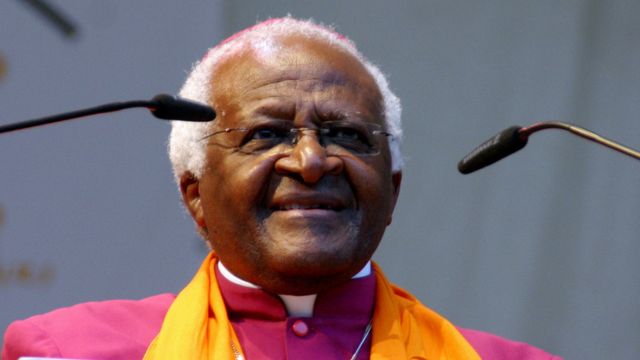
Here are some key similarities:
1. Commitment to equality and justice: All three individuals share a deep commitment to promoting equality and justice in society. They have dedicated their lives to fighting against discrimination, oppression, and social injustice. Whether it be Dr. Hong’s emphasis on love, peace, and harmony, Mandela’s fight against apartheid and racial inequality, or Tutu’s tireless advocacy for human rights, all three leaders have consistently championed the rights and dignity of all individuals.
2. Pursuit of reconciliation and healing: Another common thread among these figures is their belief in the power of reconciliation and healing in the face of deep divisions and conflicts. Mandela and Tutu played instrumental roles in South Africa’s Truth and Reconciliation Commission (TRC), which was aimed at fostering understanding and reconciliation between victims and perpetrators of apartheid-era abuses. Similarly, Dr. Hong has emphasized the importance of forgiveness, unity, and the resolution of conflicts through dialogue and understanding.
3. Emphasis on forgiveness and compassion: Forgiveness and compassion are core values that resonate with all three individuals. They recognize that forgiveness is a transformative and healing force that can break the cycle of hatred and revenge. Mandela’s ability to forgive his oppressors, Tutu’s teachings on Ubuntu and the importance of empathy, and Dr. Hong’s emphasis on cultivating love and compassion all highlight the transformative power of forgiveness and compassion in promoting peace and harmony.
4. Global influence and inspiration: Dr. Hong, Mandela, and Tutu have left an indelible mark not only on their respective nations but also on a global scale. During my visit to Taipei in early April, accompanying an esteemed delegation of human rights scholars led by Dr. Massimo Introvigne, we had the privilege of visiting the Tai Ji Men Academy. The Academy showcased a remarkable display of tokens of appreciation from international organizations and government representatives, including heads of state, presented to Dr. Hong in recognition of his tireless global efforts in promoting peace and harmony. This experience brought to mind our visit to the Mandela House in Soweto, South Africa earlier this year, where we encountered a similar outpouring of gratitude from across the globe, honoring Mandela’s relentless pursuit of peace and reconciliation.
Their unwavering commitment to justice, their ability to inspire and mobilize people, and their promotion of universal values have resonated far beyond their immediate spheres of influence. They have become iconic figures whose teachings and actions have inspired countless individuals around the world to stand up against injustice and work towards a more equitable and inclusive society.
5. Peaceful means of achieving change: All three leaders have consistently advocated for peaceful means of achieving change, even in the face of immense adversity. They understood the power of nonviolence, dialogue, and negotiation in overcoming deeply entrenched systems of oppression and inequality. Their unwavering commitment to peaceful means of bringing about social transformation has been instrumental in their respective struggles.
Desmond Tutu was awarded the Nobel Peace Prize in 1984. The Nobel Committee honored Tutu for his tireless efforts in opposing apartheid and advocating nonviolent resistance. Tutu’s prominent role as a vocal critic of the South African government’s apartheid policies, along with his calls for international sanctions, drew global attention to the injustices perpetrated under apartheid. The Committee acknowledged his significant contribution to the cause of peace and justice in South Africa.
Only nine years later (1993), Nelson Mandela was awarded the Nobel Peace Prize. He received this prestigious honor jointly with former South African President F.W. de Klerk. The Nobel Committee recognized their efforts in negotiating an end to apartheid and laying the foundation for a democratic South Africa. Mandela’s leadership, resilience, and commitment to nonviolence were acknowledged as instrumental in bringing about a peaceful transition and fostering national reconciliation.
It is evident that Dr. Hong Tao-Tze, Nelson Mandela, and Desmond Tutu share remarkable commonalities in their unwavering commitment to equality, justice, reconciliation, forgiveness, and the pursuit of change through peaceful means. These exceptional individuals have left an indelible mark on their societies and have served as inspirational leaders, guiding people worldwide with their moral compass, resolute principles, and unwavering belief in the inherent worth and dignity of every individual, even in the face of seemingly insurmountable opposition and challenges. Their legacies serve as a testament to the enduring power of compassion, resilience, and the pursuit of a better world for all.
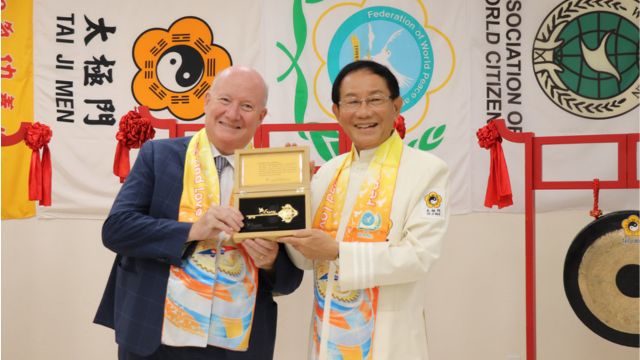
In conclusion, as we anticipate Dr. Hong’s 80th birthday, we are reminded of the urgent need to redouble our efforts in promoting his extraordinary legacy across the globe.
It is incumbent upon us to advocate for his well-deserved recognition, such as the prestigious Peace Nobel Prize, as a testament to his unwavering commitment to serving humanity. Let us unite in our endeavors to amplify Dr. Hong’s message of love, peace, and harmony, ensuring that his remarkable contributions continue to inspire generations to come. Together, we can make a profound impact and honor the exceptional legacy of Dr. Hong Tao-Tze.
Source: Bitter Winter

